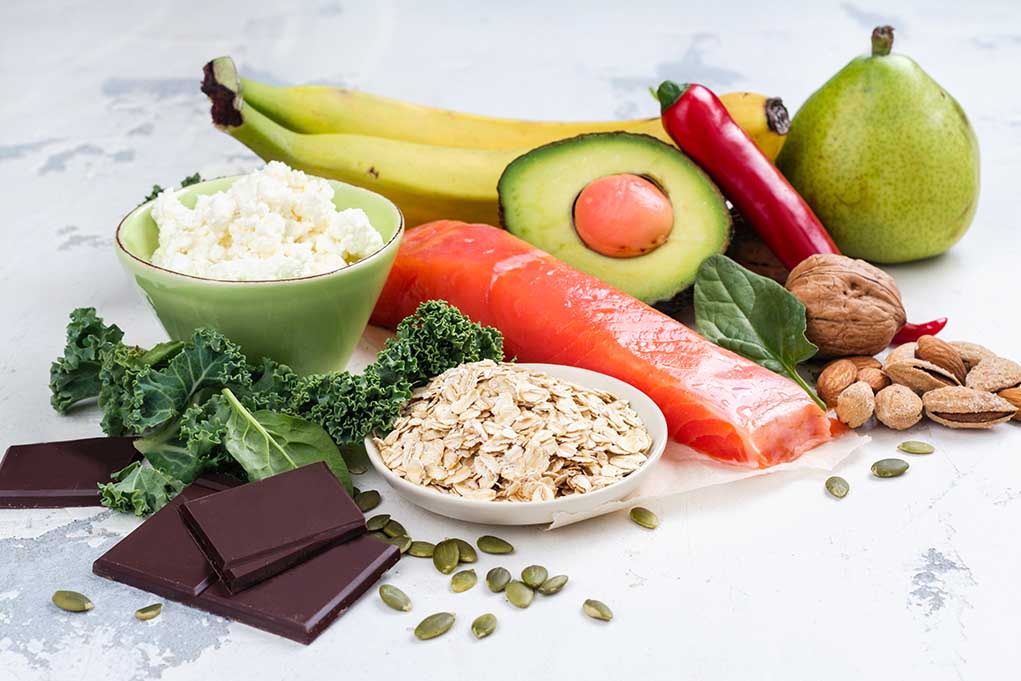Mix It Up: A Varied Diet is the Best Roadmap to Health

You probably recognize the term “superfoods.” These nutritious whole foods are thought to be exceptionally beneficial for your health. Examples include kale, often touted as “the new beef” for its hefty iron content, or acai berries, usually hyped as an antioxidant powerhouse.
For sure these edibles are low in calories and nutrient-rich, providing plenty of vitamins, minerals, and phytonutrients. But singling out foods for certain disease-fighting smarts tilts the scale in favor of the specific nutrients they provide. A diverse diet of nutritious foods ensures that we obtain all the vitamins, minerals, phytonutrients, fiber, and healthy fats required to thrive.
Whole Foods Fight Disease
Consider that other members of the kale and acai families
share their disease-fighting smarts. Kale relatives like arugula, collards and Swiss chard are also packed with iron and valued for their cancer-fighting properties. Acai are heralded for their anti-inflammatory anthocyanins which among other benefits identifies them as chronic disease inhibitors. However, these phytonutrients are also provided by many deeply colored fruits and vegetables, including blueberries and black beans all of which provide a kaleidoscope of varied nutrients.
Variety is the Secret Sauce
Rather than focusing on specific edibles like superfoods, nutritionists recommend consuming a wide variety of whole foods. Their objective? To expand the range of nutrients we consume. Nutritional science is a relatively young discipline and current research is changing its direction, driving a sharp turn away from the conventional nutrient-focused approach toward the benefits of healthy eating patterns.
The Historical Context
The practice of spotlighting “superfoods” developed from the traditional mind-set. In a 2018 essay published in the journal BMJ, reviewers traced the origins of this selective approach. They identified diseases developing from nutritional deficiencies as ground zero in this restrictive mind-set.
Beriberi provides one case in point. In the late 1800’s this disease began to show up across Asia, where white rice was a dietary staple. When rice is refined, many of its nutrients are lost, including the B vitamin thiamine. Turns out, beriberi is caused by a shortage of thiamine. Other diseases, including scurvy (vitamin C) and pellagra (niacin) were also linked with deficiencies in specific nutrients.
Targeting Nutrients Limits Their Potential
These associations paved the way for what some researchers term “nutritionism,” a fixation on targeted nutrients as the nucleus of food’s health-promoting properties. However, as our knowledge of the medicinal power of food developed, some experts began questioning this approach, which they see as reductionist. Like the human organism, food is extremely complex: It is more than the sum of its nutrients. We now know that compounds provided by food work among themselves, communicating with each other and affecting various parts of your body through channels known as biological pathways.
Consider antioxidants a class of phytonutrients often linked to superfood status. Research shows that the pharmaceutical properties of these compounds are far more effective when they are delivered in food, than as supplements. Scientists don’t fully understand why this is the case, but they do know that antioxidants have a penchant for networking with other nutrients.
For instance, numerous studies have looked at antioxidant lycopene. They show that when the compound is consumed in tomatoes --- its richest food source --- it is far more beneficial than when taken as a supplement. Moreover, when tomatoes are paired with the healthy fats provided by avocado or olive oil, the body absorbs four times more lycopene than if the tomatoes were served alone.
A 2013 study in the British Journal of Pharmacology concluded that the body processes antioxidants in a highly regulated and integrated way. In fact, large doses of these phytonutrients may disrupt its natural stability. Studies have shown that supplementation may be harmful, a phenomenon known as the “antioxidant paradox.” To oversimplify, various parts of the body work together to sustain health by maintaining a state of balance. Basically, it’s easy to reach the “overfill” line by gobbling up antioxidants.
Research suggests that overloading on some other nutrients can also have negative effects. Fat-soluble vitamins, which the body stores, are most likely to be problematic. While your chances of overdosing from eating real foods are slim, expanding the range of nutrients you consume still qualifies as wise advice. Foods that supply antioxidants also provide vitamins, minerals, fiber and, sometimes, healthy fats, along with other phytonutrients, all of which team up to support the body’s healthy natural balance.
Your Body is an Integrated System
Your body is a complex ecosystem, which means that the food you eat activates many different but interconnected pathways. Scientists have just begun investigating these relationships. How the bioactive compounds in whole foods work together helping to thwart disease and extend longevity is the new frontier in nutritional science. It’s a far cry from the nutritionist approach that characterized the past.
Judith Finlayson is a bestselling author with a longstanding interest in health and nutrition. Her most recent book, You Are What Your Grandparents Ate: What You Need to Know About Nutrition, Experience, Epigenetics, and the Origins of Chronic Disease, was published in 2019. It has been translated into 7 foreign-language editions, including French, German, Spahis and Japanese. Visit her at www.judithfinlayson.com.








